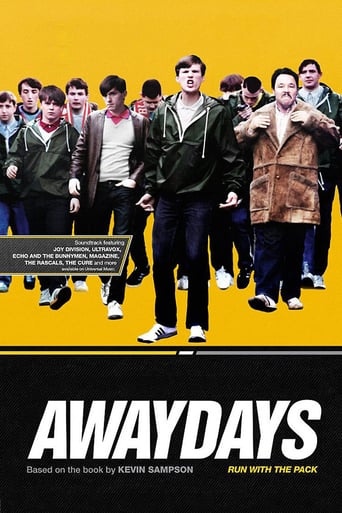IslandGuru
Who payed the critics
ManiakJiggy
This is How Movies Should Be Made
Kien Navarro
Exactly the movie you think it is, but not the movie you want it to be.
Leoni Haney
Yes, absolutely, there is fun to be had, as well as many, many things to go boom, all amid an atmospheric urban jungle.
Theo Robertson
This is has got to be one of the most bizarre movies I've seen in a very long time . It has the gloomy , gritty , realist kitchen sink drama you've seen a million times from every Ken Loach film . Somewhat conscious of this Pat Holden then introduces a contemporary soundtrack tothe film , a soundtrack that seems to go on and on . According to the wikipedia a grand total of 28 tracks are used throughout the running time . You can't get enough of doom laden nihilistic songs , tunes to slash your wrists to ? Then you'll probably enjoy AWAYDAYS . Oh and you're also a latent homosexual who can't catch enough homo erotic glances from male characters in a movie ? In that case you might just believe this is a gay , kitchen sink , pop video equivalent of GONE WITH THE WIND These aren't necessarily criticisms and AWAYDAYS would go down very well with film students wanting to discuss kitchen sink British drama or gay cinema or wider existentialist themes . Certainly the look and feel of the movie resembles that of many classic PLAY FOR TODAY dramas but the problem is there seems to be three different type of films trying to escape Certainly the best aspect of the film is its sense of time and place . Unlike Nick Love's remake of THE FIRM you really do believe the story is taking place in its chronological setting , so much so that Holden gives the impression that he owns a Tardis . The hairstyles and fashion and whole feel of the movie screams that it's 1979 Merseyside . However this is the only thing Holden manages to capture well and convey to the audience It's interesting how extreme some of the reviews on this page are and after watching AWAYDAYS you'll take on board both the praise and criticism . Both sides are right in their arguments and I'm sticking by my one line summary at the top of this review
FlashCallahan
Another year, another film about football, and the cult that is hooliganism.This time, they have Stephen Graham in a del-boy jacket and cool moustache and a quite good soundtrack to try and sell the film. It all fails miserably.It's the everyday story of a young lad who is bored with life, is at a football match and sees some violence and wants in, and starts to ignore his family in favour of the football (or rather the fighting).it's your typically clichéd movie. and the one that stands out the most is the fact that the one who lets him into the group 'Elvis', is rejected by Carty halfway through.In the films favour though, it's realistically filmed, Bell is very good in his role,and Stephen Graham may as well change his name to Robert Carlyle, as now he will always be remembered for his role in 'this is england' as Carlyle is for Trainspotting.the story doesn't really go anywhere, we just see Carty sink deeper an deeper into the abyss, all the while not realising that Elvis is blatantly in love with him.there really hasn't been a good 'Firm' movie since Clarks TV drama 'the firm', and this is just another nail in the football movie coffin.give me when Saturday comes any-day
luckiest_strike
I had prepared for a nice evening with football/hooliganism themed movies and "awaydays" was one of them. I was looking forward to it and during the beginning of the film I really liked what I saw but then I missed something. Carty doesn't really go anywhere or do anything in my opinion. In between the fights he spends time with Elvis, gets annoyed by him and leaves only to return a couple of days later. This pattern repeats throughout the film and you can see Elvis falling in love with Carty and eventually committing suicide coming from a mile away. Knowing how the film ends doesn't really add to the excitement and so it just drags on. Same for the part with his sister getting beaten up or raped and him avenging her. Also there barely is any character development. Carty is pretty simple for a main character and his sister goes through more change than him. Most guys in the Pack don't have even have any form of character to speak of. They're just there and occasionally punch and kick guys twice their age in the face.This may not be a very deep analysis but I just got bored by a film that I had been excited to see. The music although sometimes misused is very good and I also liked the overall style of the film. With a little more happening and a bit less predictability it might have been a very good movie. But it ended up as quite boring, especially if you expect to see a take on British hooligans in the 70s/80s from a young lad's perspective. I think I don't even have to mention the lack of realism (the murder of Godden and the fights always ending as if the Pack was fighting pre school kids).5/10
Jamie Ward
The year is 1978; the hippies have been replaced by the punk rockers, the depressive artists following acts like Lou Reed, Ultravox and Joy Division under the ever gloomy landscape of Margaret Thatcher's reformed Great Britain. For many it was a time to put your head down and get on with it, no matter how depressing it might have been—and then for other's it was more of an opportunity to let loose; to express the frustration built up inside by the disappointing anti-climax of the nineteen-sixties revolutions; their now forgotten refrain of "all you need is love" now replaced with council flats, minimum wage and a cheap night out at the pub to somehow make up for a day's soul-crushing monotony. Yeah, it wasn't a pretty time, and some people didn't necessarily want to make it any better. Nope, rather it was not uncommon for youngsters of the time who had nothing better to do (no jobs, no prospects, and no educational benefits) to indulge in past-times akin to pouring salt in a wound or prodding at a loose tooth just for the sake of reminding yourself of your dire situation. The country had a massive abscess, and rather than going to dentist to get it seen to, the youth would seek to the anger out through arbitrary fights with rival football fans, just for the sake of it. Sure, in retrospect it might seem a little melodramatic coming from a culture that produced the moody post-punk acts of the seventies, but Awaydays seeks to marry that sense of romance, with something a little more human too.For the most part, director Pat Holden succeeds in bringing out the potency to Kevin Sampson's novel that strives to overcome the somewhat petty, pedestrian nature of this "football hooliganism" counter-culture. The movie's first act which focuses highly on the utterly detestable and seemingly unredeemable characters who would take part in these shallow acts of psychological transference, is unsurprisingly the weakest—but what comes after is something a little more enlightening and insightful. After spending a good half hour with these chaps that you'd probably find hanging outside your local cinema harassing customer's to buy them a "bevy from the offy", Holden takes some time away from the cliché elements of Sampson's novel (domestic quibbles and teenage angst) and brings the focus onto the budding friendship of its two central characters Elvis (Liam Boyle) and Paul Carty (Nicky Bell) who are more than just drunken thugs with zero prospects.Carty is an art-school dropout who finds a lifestyle he is suddenly attracted to in the form of Elvis who is an aspiring, romantic artist who also dabbles in a bit of thuggery and drugs to make sure he's not perceived as a "total ****". Both share a common love of girls, popular, rebellious music and of course, football—or rather, beating up football fans. Unfortunately, going by scripture set in vinyl by their Godfather Ian Curtis while this common ground brings them together for short periods of time, it also tears them apart. From the offset, Carty comes off as a day-tripping tourist in search of a few months living like common people, and Elvis as an overly self-conscious sheep who is never quite sure of what he wants or how to get it—yeah, teenagers. This in turn with Holden's persistence that his feature be brimming and truthful with the emotional roller-coaster that was teenage life of the time is going to disgruntle viewers, but only because of the subject matter, rather than the way in which he portrays such subjects. Rather, taken from a distance, Awaydays is surprisingly reflective of those troublesome years, but never succumbs to the one-track mind-frame that dominates its central characters—these guys have more faults than virtues sure, but Holden makes sure to give them more than one dimension that is fleshed out after the first act into a dynamic that is thought-provoking and insightful enough to make you forget their misgivings.What really helps to keep Awaydays afloat however are the performances of its central cast who, spearheaded by the charismatic and nuanced portrayals of Elvis and Carty, nail the humanist tones that echo throughout Sampson's story. So as the movie goes on, it gets to a certain point where you actually feel for these two guys and their situation—you may not like them, but they become more than just caricature thugs glorifying their right to expression by cutting up strangers' faces. Of course, there are still problems going into the film's closing stages which result largely from the melodrama associated with all this romantic tint put on the two character's plight, but when taken in context of Holden's otherwise extremely grim and bleak tale of late seventies street crime, such minor distractions fail to take any major precedence. The result is a surprisingly mature memoir of a time dominated by teenage angst and rebellion against a rather inhospitable society that—although flawed—works far more than it necessarily should.A review by Jamie Robert Ward (http://www.invocus.net)

